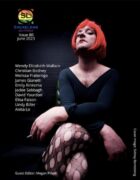You give us such a fascinating glimpse into the absurdity behind the scenes of advertising. What inspired you to explore this profession?
I once had a job that involved adding stock photography images to PowerPoint slides, and I always wondered how those photos came to be. Did each photo come from a themed shoot around, say, camping? Or did one set of actors have to rotate through a dozen scenes in the span of a day? I thought it would be interesting to explore the latter possibility.
The narrator’s characterization is so stripped down, which makes him the perfect narrator for the neutral world of stock photography. Yet his emotional reactions imply great depth. How did you find the right voice for this guy to balance the minimal characterization?
Whenever I started to add too much detail to the character, it felt wrong for the story. Removing characterization, and flattening this guy’s humanity, seemed to pick at the wound he’s feeling. The core of the story, for me, is that he’s deeply uncomfortable with all the persona switching that’s required of him, both in this job and (though this is more implicit) in his real life. Perhaps because he’s getting older, perhaps because he’s out of touch, perhaps because he’s made some mistakes—whatever it is, he doesn’t really know himself. He’s not happy in his own skin. Hopefully, the reader feels that he is confronting something critical over the course of this day.
This story has such rhythm, especially with the cadence of short sentences and the way they present and then decontextualize detail. What’s your approach to rhythm when writing?
It really varies. A wonderful thing about writing flash fiction is that you can focus on a stylistic element without running too great a risk of exhausting your audience, and you can change your focus in the next story. In this case, I thought that the short sentences complemented the disorientation the guy feels as he catapults from one scene to the next.
What are your secrets for pulling off humor, which works splendidly in this story?
Thank you! Most of my favorite comic characters are blundering and confident. That confidence always lands them into trouble, even if the trouble doesn’t end up being all that serious. (Bertie Wooster is a real touchstone for me.) So I thought I would use that formula: Make the guy overly confident about how he’s supposed to act in the world, then have all the other characters prove how wrong he is. Of course, he’s quite insecure, and the stakes are high for him, so this story isn’t purely a comedy. But the parts that are comic were influenced by this tradition.
Your website bio mentions that you have novels in the works. We could talk all day about the differences between flash fiction and novels. How about what they have in common?
Flash fiction can be so diverse, as can novels, but the best novels, in my opinion, often operate like an unspooling series of flash pieces. In a novel, there’s going to be a larger arc and a pleasure for the reader in seeing that paid off. And yet each page has to have some standalone morsels. There’s the old adage that novels are failed stories, and stories are failed poems. My ideal novel is when each chapter feels like a great piece of flash fiction, and each sentence feels like a dash of poetry.




 The core workshop of SmokeLong Fitness is all in writing, so you can take part from anywhere at anytime. We are excited about creating a supportive, consistent and structured environment for flash writers to work on their craft in a community. We are thrilled and proud to say that our workshop participants have won, placed, or been listed in every major flash competition. Community works.
The core workshop of SmokeLong Fitness is all in writing, so you can take part from anywhere at anytime. We are excited about creating a supportive, consistent and structured environment for flash writers to work on their craft in a community. We are thrilled and proud to say that our workshop participants have won, placed, or been listed in every major flash competition. Community works.